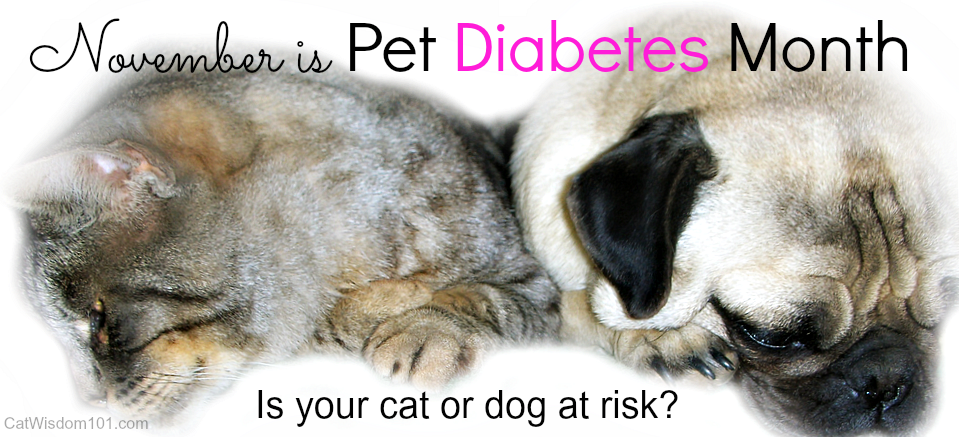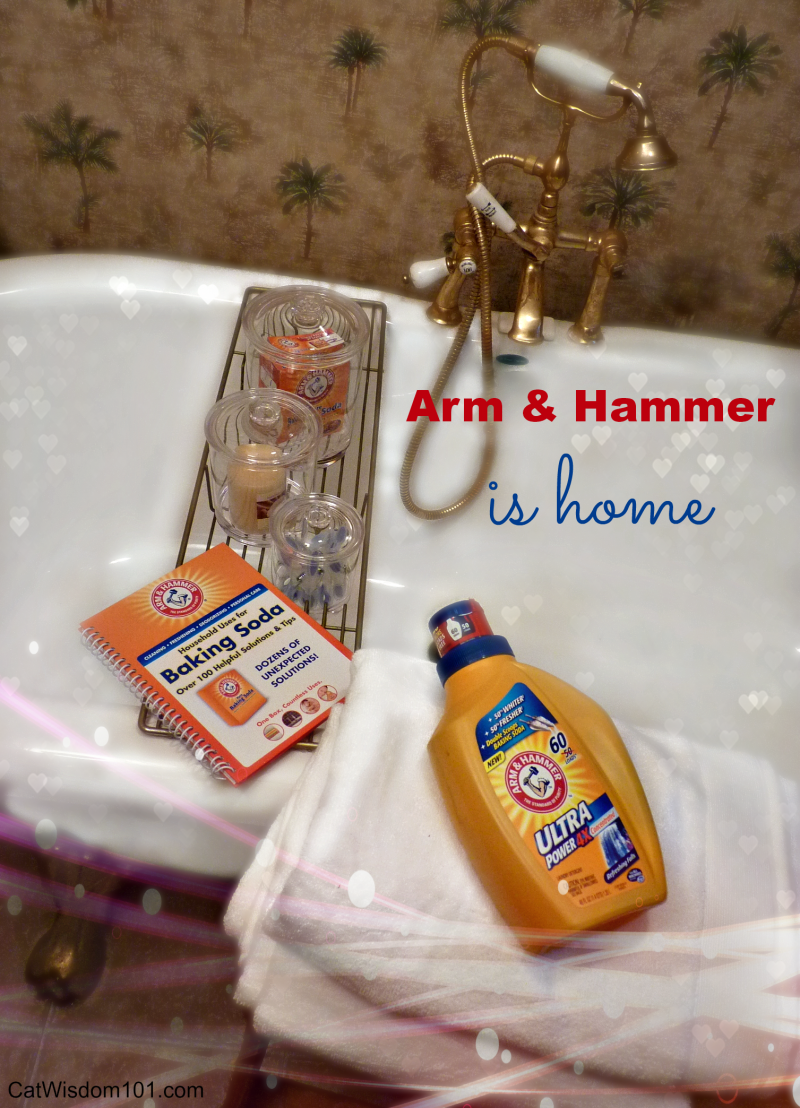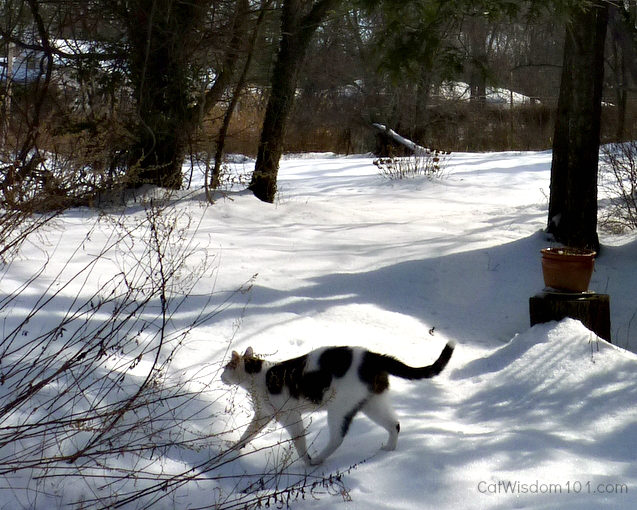Vet 101: Pet Diabetes Month: Could Your Cat Be at Risk?

November is “Pet Diabetes Awareness Month” to bring awareness of the growing epidemic of diabetes in North America for human and pets. Sadly, cats and dogs can develop diabetes and our vet Dr. Richard Goldstein tackles a not so sweet subject with his usual humor and expertise with this week’s Q & A.
Q: I was recently diagnosed with type 2 diabetes which means losing weight and exercising but now I’m worried about my cat. We’re both on the heavy side and love Cheetos. She’s a five-year-old female tabby cat and weighs 15 lbs. Are the symptoms for diabetes the same as humans?
Diabetes mellitus in cats is usually type 2, just like you. That means it’s non-insulin-dependent. In other words, the cat’s body may be making some insulin, but it’s not able to work properly or there’s not enough of it. Over the past 20 years or so, diabetes has become much more common in cats. So has obesity. Is there a link? You betcha!
Cats are obligate carnivores. They must eat meat-based foods that are high in protein, moderate fat, and low carbs (let’s repeat that: LOW CARBS!). Over the past 20 years or so, pet food companies have trained us humans that we need to feed our cats dry food. Is it just coincidence that cats have become fatter and developed more diabetes? Dry food by its nature has more carbs: you can’t make a cookie without flour, right? Our tendency is to fill up a bowl of dry food and let Fluffy snack all day. It’s like turning her loose with a bag of cookies and letting her sit on the couch watching tv all day. If you think about it, have you ever seen an overweight diabetic feral outdoor cat? Rarely, if ever, I’d bet. That’s because they’re getting lots of exercise hunting for dinner, and they’re eating what they were built to eat: rodents and birds.
Improper nutrition can lead to a pre-diabetic condition called glucose intolerance, where the cells of the body don’t respond to the insulin, or there’s not enough being made by the pancreas. The result is too much sugar floating in the bloodstream. All those big sugar molecules pull a lot of water into the bloodstream with them. The result is increased thirst, and increased urination. If we’re not feeding enough protein, the body responds by breaking down protein – muscle – which leads to weight loss and increased appetite. And over time, all that extra sugar can serve as a perfect food for bacteria, leading to urinary tract infections or even pneumonia.
Now that we see diabetes as a nutritional disorder in cats, we can see that one of the most important points in treating this disease in cats is getting them on a proper diet. Cats that have glucose intolerance can often reverse the process by upping the protein and lowering the carbs in their diet, and may not ever need insulin. In those cats that do end up needing insulin, MANY will eventually go into “remission” and not require insulin anymore (or at least for a while) if they eat the right foods. Talk to your vet about options for nutrition and insulin (if needed). There are also some great websites out there on feline diabetes management, including great demos on how to monitor your cat’s blood sugar at home.
Visit http://www.petdiabetesmonth.com/ for more info and a diabetes checklist before your vet visit.





17 Comments
Cheryl Bond
Hey Constance, Even if your cat is not over weight per say, feline’s that are fed a dry food based diet are going to be at least marginally dehydrated. Even if they drink water, a dry food diet dehydrated the kidneys. Kidney disease is one of the predominant diseases Vet’s see cats for. It is not something that happens overnight, just like improper nutrition for human’s doesn’t get us I’ll overnight. Usually by the time kidney disease is uncovered in cat’s, it’s too late, and only small measures (like daily home fluid hydration w/ a needle & lactated ringer) can be taken to help them ease some of the chronic dehydration. By this time, it is too late, the disease is chronic & it will only he a matter of time till they will pass from the disease.
Even with a “better quality” dry, than say the “bottom of the barrel” dry food, a feline diet devoid of moisture from the food, isn’t the best nutrition. You could be spending a LOT of money, all for nothing! Please read everything you can on the subject, you will be very surprised the facts you uncover.
Also, besides the dehydration issue, from dry foods, there are MANY other factors to consider as far as nutrition such as contamination of toxic 3-D meat-by-products, endotoxins, mycotoxins etc. The petfood industry is one of the most shockingly unregulated industry’s, where mandated laws are regularly ALLOWED to be disregarded by petfood manufacturers ALL THE TIME. Don’t take my word for it, research all the information for yourself, it’s all out there!
Some resources:
–TAPF.com (Truth about Petfood… Leading Consumer Advocate)
–LittleBigCat.com (Dr. Jean Hofve DVM–writes on the subject of feline health & wellness)
–Dr.Mercola.com (Dr.Karen Becker DVM) writes on the subject of pet’s health and wellness
****There is also available, books specifically about education to prepare homeade BALANCED rawfood diet. Some people, for convenience sake prefer purchasing an already prepared frozen rawfood diet. One of the best, is Darwin’s and they have very helpful representatives to be able to discuss whatever questions you might have****
Just so you know, I do NOT work for ANY of the above mentioned resources.
Cheryl Bond
Hey Andrea, You had mentioned that you were going to get your cat re-tested & then figure out if you need to maintain a “diabetic diet”; You hadn’t mentioned what you were feeding your cat. Well, a diet low in carbohydrates should be the diet for ALL obligate carnivore’s (cats) , not just for when they have diabetes. If that type of diet was followed for all cats, they wouldn’t be getting diabetic in the first place. Outside of med’s, like prednisone, that can
certainly bring on diabetes, diet is the number one cause. Many Vets that are prescribing these “so called” diabetic diets, are very un-educated on nutrition. Infact, they recieve about 3 hrs of nutrition “education”, if you can even call it that, because the “education” is taught & sponsored by the petfood industry ; this is a huge conflict of interest!
I have read the ingredients of these “so called” prescription diabetic diets, and they are a joke! They are filled w/ carbohydrates (like corn, wheat etc) that spike insulin levels. If you were to read some books from Holistic feline nutritionist’s you would see that they are made to eat meat, real meat & not processed by-product “meat” . Research for yourself what 3-D meat-by-products are, mycotoxins, endotoxins, and how a PROPERLY prepared raw food diet is what cats will thrive on. Many cats, just like people will become habituated & addicted to a “junk-food diet”, it can be challenging to change over your pet’s diet, but it can be done & there are many people who have faced that same challange & have great tips & creative ideas on how they have successfully done so. Patience & fortitude, those are the key components.
I should also mention, that Sadly, many Vet’s uninformed & uneducated about the raw food diet will shoot it down, they can’t/won’t recommend it, because they know nothing about it! Remember they just don’t have the proper education about it. I liken it to this…you wouldn’t go to a gynecologist,
if you had an ear problem, right? Well, that’s basically similar to trying to get advanced nutrition information from your reg Vet (unless she or he has an advanced degree in feline nutrition) also it should be noted that feline & Cannine nutrition is totally different needs as well.
Some resources for you, to help you learn about feline nutrition are…
–TAPF. Com (Truth about Petfood)
–Dr.Mercola.com (Dr.Karen Becker DVM writes on the subject matter of health & nutrition for pets)
–LittleBigCat.com (Dr.Jean Hofve DVM writes of the subject of feline health & nutrition)
***You can find specific books w/ how to go about properly formulating a homeade BALANCED rawfood diet (which isn’t as hard as you might think) as long as you properly educate yourself on the matter)
***You can also, (for convenience sake) purchase a frozen rawfood diet as well. One of the top rated brands nationally is Darwin’s, you can check them out online. You can call them & speak to a very helpful & informative representative. (I am in no way affiliated w/ them)
I hope some of this information will be helpful to you & for your beloved pet’s health & wellness.
Be well,
Cheryl
???
Gwenelda
The forum is a briethgr place thanks to your posts. Thanks!
Andrea
I’ve had several diabetic cats in the past and had to deal with insulin injections and testing at home. In fact my last diabetic died because of complications.
Many different things can cause diabetes though I am certainly happy that we now know about the great importance of diet and exercise. One of my cats, Lando Calrissian, developed diabetes after being on Prednisolone for an extended time as treatment for his mast cell tumors. When he was off pred. his diabetes went away.
Now I’m watching Sky Voice closely because he recently had a very high glucose reading. He was also on pred (but is done with that now). We’ve put him on a diabetic diet and his glucose is back to normal. We’ll probably test him again soon and decide if he needs the diet anymore.
I think it is important to have geriatric cats tested at least annually to check for these types of conditions. Thanks for the great post!
Layla Morgan Wilde
Andrea, glad you enjoyed. Our vet suggests more frequent visits with age. Merlin is seen @ 4 X a year.
Francesca Villa
Awesome post!!!!
Judi
My horse, Cruiser, is diabetic, though they call it insulin resistant in horses. We control is with a low carb diet and exercise. Although horses never get to the point of needing insulin, there are other serious complications that can arise like laminitis, or in Cruiser’s case, tendon and ligament injuries.
Kathryn
Great info. After Cheddar (yep, an orange boy) nearly died last year from struvite crystals, we feed him and his bro 50 to 75 percent prescription vet food dissolution/urinary formula – mostly wet food, and some dry food. I do give them a bit of commercial wet food, but no commercial dry food. They’re both lovey fatties, but so far, no diabetes and no more crystals. I had been giving them fish. No more fish.
I am mostly vegetarian, and no sugar and no salt, so well aware of how toxic sugar and carbs are.
Layla Morgan Wilde
I forgot it’s been a year since poor Ched’s experience How is he now?
Sue Brandes
I am learning so many new things about diabetes in cats. I had two in my lifetime. Both had insulin. Now they say so much about diet. My favorite rescue has 2 diabetic cats and they were able to reverse the insulin with good diet were they no longer need shots.. So wonderful to hear about new ways to help your kitties get better or stay healthy.
Skeeter and Izzy
So good to know about the reversal with proper diet! We try to limit the dry stuff and only feed grain free at that.
Thanks Dr. G!
Luvs skeeter and IZZY and the Feral Gang + Peanut and Twig >^..^<
Brian Frum
Good info! We are trying our best to eat healthy here!
Carolyn
Austin has only recently started to gain weight. He was always so skinny and a picky eater. Because of that I do tend to let him graze on kibble, but now he is a healthy 5kgs I am trying to cut back on the hard stuff!! Thanks for the info 🙂
Katnip Lounge
I had a diabetic kitty who lived to be 19! Nowadays I feed a much better grade of food, and when Miss Kona passes (hopefully not too soon) I’ll switch over to wet/raw exclusively.
Constance Marie
Good info. I’m still feeding a quality dry food, alway will. My cats definitely not over weight.
I’ve never really seen a healthy feral cat, not unless some human is helping them.
I get so tired of hearing about carbs. Guess I’m crabby today!!
easy rider
That was interesting, many thanks. We will check out this site and the link is bookmarked now.
Sparkle
We are all trim and healthy here, because my human is very strict about what we eat! Binga and Boodie get grain-free canned food ONLY (and my human is thinking of working raw into the equation). I get to eat “grain free” kibble sometimes (although it is higher in carbs than canned) because I’m underweight and a picky eater. So our risk of diabetes is low. Now, if I could only do something about my human’s sweet tooth and get her to eat more meat and vegetables (and no, banana cream pie does not count as fruit… geez!).